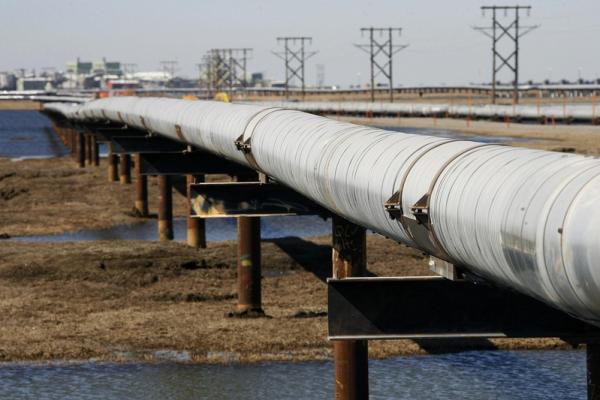SINGAPORE, Dec 10 (Reuters) - Oil prices dropped on Tuesday
for a second straight session as the cons of a slowing global
demand outlook outweighed the pros of OPEC's agreement with
associated producers at the end of last week to deepen crude
output cuts in early 2020.
Brent futures LCOc1 were down 11 cents, or 0.2%, at $64.14
per barrel by 0204 GMT while West Texas Intermediate oil futures
CLc1 were down 7 cents, or 0.1% to $58.95 a barrel. The
benchmarks fell 0.2% and 0.3% respectively on Monday.
"The euphoria (on output cuts) was short lived, with an
unexpected fall in exports from China highlighting the impact of
the trade conflict," said ANZ Bank in a note on Tuesday.
Data released on Sunday showed exports from China in
November fell 1.1% from a year earlier, confounding expectations
for a 1% rise in a Reuters poll. That weakness came amid with fresh fronts in the trade war
between Washington and Beijing that has stymied global economic
growth coming up fast: Washington's next round of tariffs
against some $156 billion Chinese goods are scheduled to take
effect on Dec. 15.
U.S. President Donald Trump does not want to implement the
next round of tariffs, U.S. Agriculture Secretary Sonny Perdue
said on Monday - but he wants "movement" from China to avoid
them. "With the swathe of new tariffs due to kick in on 15
December, the market is watching negotiations closely," said
ANZ.
Analysts said that, though overshadowed for now, the move by
'OPEC+' - the Organization of the Petroleum Exporting Countries
(OPEC) and associated producers like Russia - to deepen output
cuts from 1.2 million barrels per day (bpd) to 1.7 million bpd
would remain a mid-term support factor. "While risks remain into year-end on U.S.-China trade talks,
the OPEC decision removes a fundamental uncertainty," said
Stephen Innes, market strategist at AxiTrader.
"So, prices aren't about to fall off a cliff anytime soon if
OPEC has a say in the matter."
- English (USA)
- English (UK)
- English (India)
- English (Canada)
- English (Australia)
- English (South Africa)
- English (Nigeria)
- Deutsch
- Español (España)
- Español (México)
- Français
- Italiano
- Nederlands
- Português (Portugal)
- Polski
- Português (Brasil)
- Русский
- Türkçe
- العربية
- Ελληνικά
- Svenska
- Suomi
- עברית
- 日本語
- 한국어
- 简体中文
- 繁體中文
- Bahasa Indonesia
- Bahasa Melayu
- ไทย
- Tiếng Việt
- हिंदी
Oil prices slip again as spectre of trade war, demand concerns haunts market
Published 12/10/2019, 10:07 AM
Updated 12/10/2019, 10:08 AM
Oil prices slip again as spectre of trade war, demand concerns haunts market

Latest comments
Install Our App
Risk Disclosure: Trading in financial instruments and/or cryptocurrencies involves high risks including the risk of losing some, or all, of your investment amount, and may not be suitable for all investors. Prices of cryptocurrencies are extremely volatile and may be affected by external factors such as financial, regulatory or political events. Trading on margin increases the financial risks.
Before deciding to trade in financial instrument or cryptocurrencies you should be fully informed of the risks and costs associated with trading the financial markets, carefully consider your investment objectives, level of experience, and risk appetite, and seek professional advice where needed.
Fusion Media would like to remind you that the data contained in this website is not necessarily real-time nor accurate. The data and prices on the website are not necessarily provided by any market or exchange, but may be provided by market makers, and so prices may not be accurate and may differ from the actual price at any given market, meaning prices are indicative and not appropriate for trading purposes. Fusion Media and any provider of the data contained in this website will not accept liability for any loss or damage as a result of your trading, or your reliance on the information contained within this website.
It is prohibited to use, store, reproduce, display, modify, transmit or distribute the data contained in this website without the explicit prior written permission of Fusion Media and/or the data provider. All intellectual property rights are reserved by the providers and/or the exchange providing the data contained in this website.
Fusion Media may be compensated by the advertisers that appear on the website, based on your interaction with the advertisements or advertisers.
Before deciding to trade in financial instrument or cryptocurrencies you should be fully informed of the risks and costs associated with trading the financial markets, carefully consider your investment objectives, level of experience, and risk appetite, and seek professional advice where needed.
Fusion Media would like to remind you that the data contained in this website is not necessarily real-time nor accurate. The data and prices on the website are not necessarily provided by any market or exchange, but may be provided by market makers, and so prices may not be accurate and may differ from the actual price at any given market, meaning prices are indicative and not appropriate for trading purposes. Fusion Media and any provider of the data contained in this website will not accept liability for any loss or damage as a result of your trading, or your reliance on the information contained within this website.
It is prohibited to use, store, reproduce, display, modify, transmit or distribute the data contained in this website without the explicit prior written permission of Fusion Media and/or the data provider. All intellectual property rights are reserved by the providers and/or the exchange providing the data contained in this website.
Fusion Media may be compensated by the advertisers that appear on the website, based on your interaction with the advertisements or advertisers.
© 2007-2024 - Fusion Media Limited. All Rights Reserved.